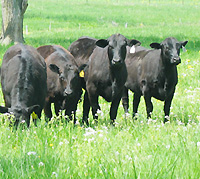Premise ID Program Under Way
Premise ID Program Under Way

A voluntary program that traces the location of farm animals throughout the state is providing a valuable risk management tool to livestock producers.
The program is called premise identification. It’s the first step toward development of a National Animal Identification System (NAIS), which will provide more efficient isolation of animal operations and limit the possibility of an entire industry becoming involved in a disease incident, said Jim Akers, University of Kentucky Beef IRM coordinator.
“State veterinarians in all but about six states are currently registering premise IDs,” he said. “It is nothing more than a farm number. They are asking people to voluntarily register so they can begin to get their systems in order to make sure they have unique numbers on farms, markets and locations that house livestock.”
The Premise ID system assigns a nationally unique seven digit code to all participants in NAIS. The premise code is for producers as well as non-producers such as markets, veterinarians, service providers and tag distributors. The state animal health official maintains a database of information on a U.S. Department of Agriculture server system.
In the past, different numbers where used for different tracking systems, such as those for brucellosis or tuberculosis. This resulted in duplicate numbers across state lines, so those numbers could not be used.
“They are trying to get to where each farm has one number so when you deal with the USDA relative to livestock you have one number,” he said. “It doesn’t matter if you have chicken houses, cattle or hogs, it is one number. It will speed up the process of tracking a disease.”
Information requested on the identification form is farm name, contact name, address, phone number, physical address of location and species of animals reported. The identification number is assigned to a location not an individual or business, Akers said. If a farm is sold, the number goes with it. Each property should be registered separately.
More than one producer may have animals at the same location but they will use the same premise number. The program is not about who owns the animals, it is about where they are for disease surveillance purposes, Akers said. The entire program is voluntary and, unless mandated by state or federal government, producers are not required to tag an animal.
Akers said the market already is asking that animals be tagged for source and age verification and to provide traceability. It is up to the producer to decide whether to respond to the market.
But tagging alone is not enough. The tags need to be tied to the premise identification in order for the system to work. This can be done through a reputable service provider that is cooperating with the state animal health official such as the Kentucky Beef Network or Southeastern Livestock Network. A producer can choose to report other information for marketing purposes, but this information is not a part of the governmental side of the animal identification system.
Sign up information may be available at a county office of the University of Kentucky Cooperative Extension Service or through the Kentucky Department of Agriculture’s Web site. The form is to be mailed to the Kentucky State Veterinarian and a premise number will be returned by e-mail or mail.